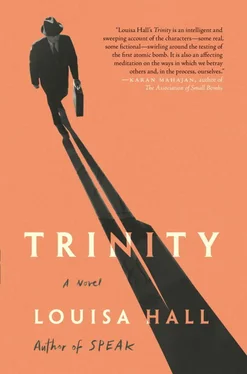Maybe there were a few superficial differences. His hair was cut shorter, that much is true. And let’s not forget that he’d become famous. In one year, can you believe it, he was on the cover of Time magazine twice. The Father of the Atom Bomb! Or maybe it was the cover of Life . One or the other, he’d been on it twice, and I bought copies of both. I kept them on the coffee table, until Jacqueline put them away in the bookshelf.
Once, I picked up a magazine at a newsstand and on the cover there was only a lab stool and his porkpie hat. That’s how famous he was. He’d entered the metonymic realm!
Of course, between you and me, I can tell you that hat wasn’t exactly an original choice. He only started wearing it after Bernard Peters joined up with our group. Opje might have been his advisor, but we all looked up to Peters. He’d been sent to Dachau for Communist activity. Then he escaped and made his way to Berkeley, wearing a brown felt porkpie hat.
A few months later, Opje was wearing one also. But what does it matter? By the time Opje came to visit in Paris, that was his hat on the cover. You saw it at every magazine stand you passed. It even showed up in the newsreels. You’d go to the cinema and there he was, sitting with Eleanor Roosevelt and a bunch of bigwigs in bow ties, and every time I saw him presented like that—quoting Donne and the Bhagavad Gita, his hair cropped so close his head looked like a skull—it made me laugh.
Could that really be Opje? I had to rub my eyes!
There he was on the screen, looking so somber, the same guy who once kept his hair in that unruly cloud. Once he took me riding over a mountain pass near Santa Fe, and he wouldn’t turn back when it started to hail. He must have had some kind of death wish! Those hailstones were like marbles, but Opje wouldn’t take shelter. We rode over that pass covering our heads with our arms like we were under enemy fire, and when we finally got back to the house it took a whole bottle of whiskey to warm us.
That was 1938, or maybe 1939, the summer Barb and I visited Opje in New Mexico. There was no electricity in his cabin, and no running water. We drank our whiskey out of tin cups. We ate Vienna sausages straight from the can. It was lucky I brought my pocket knife with the inlaid turquoise handle, because as soon as we got there, Opje realized he didn’t have an opener.
What would we have done? We might not have eaten all week! But even so, Opje would have had a fine time. He never ate much. He had a few bites, and then he sat back and while the rest of us were finishing, he recited poetry, or talked to us about permanent free fall, and when he had to piss he did it outside under the stars, and when he came back in he was smiling.
That was the Opje I knew in Berkeley, not the Opje up there on the screen. But time does funny things. Or that’s what I said to myself, when I was waiting for him and Kitty on the balcony outside our little apartment. Inside, Jacqueline arranged the tulips she’d managed to find, and I tried to imagine what Opje would look like.
It was spring when they came, but it was still cold. I sat there on the balcony looking out over the spirally rooftops and the low, miserable clouds, and at one point Jacqueline came out and asked me to sponge off the tables. But I was so caught up in wondering whether Opje had changed that I completely forgot what she’d asked me. Instead, inspecting those rooftops, I thought that, to a certain extent, I would have to “face facts.” He probably wasn’t the same Opje I’d known back in Berkeley, when I was working on my monograph on Native American myth. How could he be? A lot of time had intervened. There had been a war. Some people said that Opje had won it.
Now he was a great American hero. He was in Paris for an international conference on diplomacy in the atomic age. He’d given his country a power that set it above every other country on earth. By then, every week, Radio Moscow made some new announcement about how close their atom bomb was to completion, but no one really believed them, and in Paris, waiting for Opje to show up, I tried to prepare myself for the fact that he might have been changed.
I told myself he probably wouldn’t walk in the door looking just like he had when he was another assistant professor at Berkeley, with that big cloud of curly hair and that belt he wore with the Navajo buckle.
While Jacqueline finished the soup, I stayed out there on the balcony, looking out over the bare trees and the gray city, feeling more and more cross about the things time does to the people we care for, and then, finally, a cab pulled up, and Opje stepped out.
Sure enough, even from above I could see he looked different. He wasn’t wearing his hat. His hair was shorter, and it had gone gray. His overcoat must have cost him a fortune.
Then Kitty stepped out behind him, and I’ll tell you what. She was wearing a mink coat, and her hair was done in an awful new style, cut just under her chin, and sort of rounded and sprayed in the shape of a helmet.
I was so disappointed! I imagined them climbing the stairs, passing the shared bathroom we used on the stairwell, and there was a knot in my stomach when I went to the door. But then I opened it up, and there they were, and I saw that underneath her new helmet, Kitty was still almost as pretty as she was in the old days, back when she and Opje first met and she came with him to a dinner party we threw at Barb’s house.
Now she was wearing a pair of diamond earrings the size of small grapes, but when she went up on her tiptoes to kiss me, and Opje grinned, and held out a salad in a big wooden bowl, and a bottle of Château Cheval Blanc, I knew right away that they were the same people.
I took the wine and Opje held on to the salad, and they moved through that little Paris apartment—the only thing we could afford, between my lecturer’s pay and Jacqueline’s graduate stipend—and acted as impressed as they would have acted walking into that house on the coast that Barb inherited from her parents.
That apartment was no bigger than the laundry room in Barb’s house, but Opje seemed genuinely delighted. He loved the exposed beams and the view over the rooftops. He walked around acting so excited and happy to be there, and it was clear right from the start that though our lives had taken two different forks, he didn’t hold himself above me.
He was still the same guy he was when he lived in that house on Shasta Road, with the hammock slung up on the back porch. And he was just about to put the salad bowl down when Jacqueline swooped past, murmuring apologies, and sponged off the tables. Then she smiled shyly and let him put the salad bowl down, and I saw Opje notice how pretty she was.
I’ll tell you what: that made me feel good. I realized then how lucky I was, to live with Jacqueline in that little apartment. She was so pretty and sweet, and such an excellent cook, and the spread we laid out for Opje and Kitty was simple but it was as good as anything they’d have been served at any pretentious French restaurant.
We started with the onion soup and a loaf of excellent bread, and I’d spent more than I should have on a few bottles of good Languedoc. Then we opened the Château Cheval Blanc. And by the time we’d finished that bottle, I’d remembered Opje’s famous martinis.
Those martinis! He used to keep glasses chilled in the freezer. Even in that little house, where he sometimes slept on the back porch and ate nothing but peanut butter out of the jar, he always kept a box of the best gin in his pantry.
I told that little story while we finished our salad, and we all had a good laugh, and then we decided the only proper thing we could do to celebrate the old days back in Berkeley was to make a few of Opje’s famous martinis. Then Opje and I went to the kitchen, leaving Jacqueline and Kitty to get to know one another, and for a moment, just before we closed the door, I remembered that Barb once said Kitty could be a difficult person.
Читать дальше












